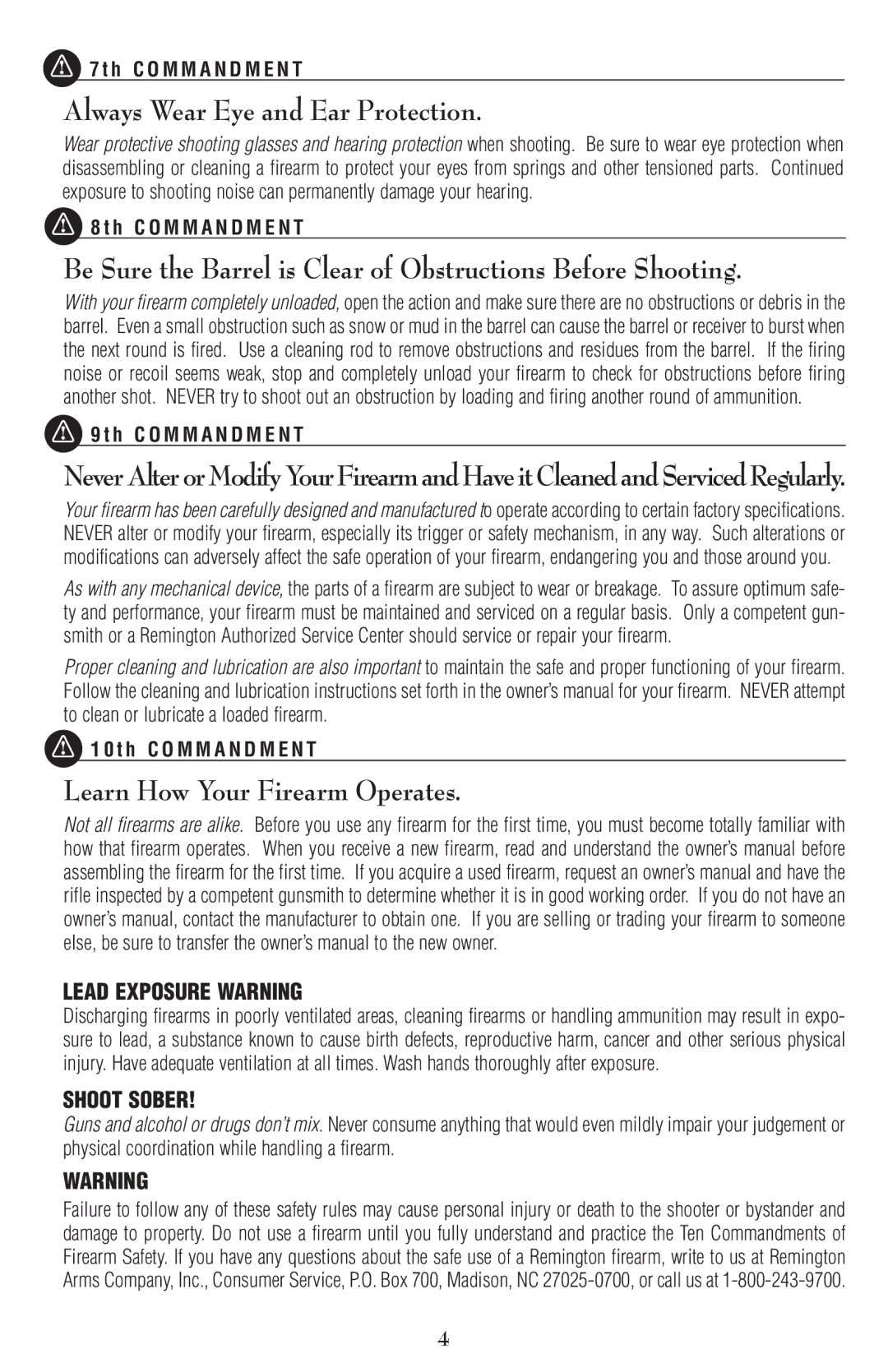
![]() 7 t h C O M M A N D M E N T
7 t h C O M M A N D M E N T
Always Wear Eye and Ear Protection.
Wear protective shooting glasses and hearing protection when shooting. Be sure to wear eye protection when disassembling or cleaning a firearm to protect your eyes from springs and other tensioned parts. Continued exposure to shooting noise can permanently damage your hearing.
![]() 8 t h C O M M A N D M E N T
8 t h C O M M A N D M E N T
Be Sure the Barrel is Clear of Obstructions Before Shooting.
With your firearm completely unloaded, open the action and make sure there are no obstructions or debris in the barrel. Even a small obstruction such as snow or mud in the barrel can cause the barrel or receiver to burst when the next round is fired. Use a cleaning rod to remove obstructions and residues from the barrel. If the firing noise or recoil seems weak, stop and completely unload your firearm to check for obstructions before firing another shot. NEVER try to shoot out an obstruction by loading and firing another round of ammunition.
![]() 9 t h C O M M A N D M E N T
9 t h C O M M A N D M E N T
NeverAlterorModifyYourFirearmandHaveitCleanedandServicedRegularly.
Your firearm has been carefully designed and manufactured to operate according to certain factory specifications. NEVER alter or modify your firearm, especially its trigger or safety mechanism, in any way. Such alterations or modifications can adversely affect the safe operation of your firearm, endangering you and those around you.
As with any mechanical device, the parts of a firearm are subject to wear or breakage. To assure optimum safe- ty and performance, your firearm must be maintained and serviced on a regular basis. Only a competent gun- smith or a Remington Authorized Service Center should service or repair your firearm.
Proper cleaning and lubrication are also important to maintain the safe and proper functioning of your firearm. Follow the cleaning and lubrication instructions set forth in the owner’s manual for your firearm. NEVER attempt to clean or lubricate a loaded firearm.
![]() 1 0 t h C O M M A N D M E N T
1 0 t h C O M M A N D M E N T
Learn How Your Firearm Operates.
Not all firearms are alike. Before you use any firearm for the first time, you must become totally familiar with how that firearm operates. When you receive a new firearm, read and understand the owner’s manual before assembling the firearm for the first time. If you acquire a used firearm, request an owner’s manual and have the rifle inspected by a competent gunsmith to determine whether it is in good working order. If you do not have an owner’s manual, contact the manufacturer to obtain one. If you are selling or trading your firearm to someone else, be sure to transfer the owner’s manual to the new owner.
LEAD EXPOSURE WARNING
Discharging firearms in poorly ventilated areas, cleaning firearms or handling ammunition may result in expo- sure to lead, a substance known to cause birth defects, reproductive harm, cancer and other serious physical injury. Have adequate ventilation at all times. Wash hands thoroughly after exposure.
SHOOT SOBER!
Guns and alcohol or drugs don’t mix. Never consume anything that would even mildly impair your judgement or physical coordination while handling a firearm.
WARNING
Failure to follow any of these safety rules may cause personal injury or death to the shooter or bystander and damage to property. Do not use a firearm until you fully understand and practice the Ten Commandments of Firearm Safety. If you have any questions about the safe use of a Remington firearm, write to us at Remington Arms Company, Inc., Consumer Service, P.O. Box 700, Madison, NC
4
